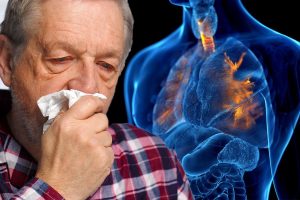Statins: The ‘serious’ side effect that could signal lung disease – ‘Call a doctor’

Statins: How the drug prevents heart attacks and strokes
We use your sign-up to provide content in ways you’ve consented to and to improve our understanding of you. This may include adverts from us and 3rd parties based on our understanding. You can unsubscribe at any time. More info
According to the NHS, a cough can be a side effect of taking atorvastatin – a drug used to lower cholesterol. And in this case it can signal lung disease. If you notice you have a cough, the health service advises to stop taking the medication and call a doctor or 111 as soon as you can.
Atorvastatin is prescribed to people who have been diagnosed with high blood cholesterol, and can prevent heart disease including heart attacks and strokes.
It can also be used by those with a family history of heart disease, or a long-term health condition such as type 1 or type 2 diabetes or rheumatoid arthritis.
The most common side effects of the drug affect more than one in 100 people and include:
- Feeling sick or indigestion
- Headaches
- Nosebleeds
- Sore throat
- Cold-like symptoms, such as a runny nose, blocked nose or sneezing
- Constipation or flatulence
- Diarrhoea.

However, there are a number of other, more serious, side effects.
Along with a cough, losing weight and experiencing shortness of breath while taking atorvastatin could also point to lung disease.
The NHS explains other side effects to look out for. “If you get unexplained muscle pain, tenderness, weakness or cramps these can be signs of muscle breakdown and kidney damage,” it says.
“If the whites of your eyes turn yellow, or your skin turns yellow, although this may be less obvious on brown or black skin, or if you have pale poo and dark pee, these can be signs of liver problems.
“If you get a skin rash with pink or red blotches, especially on the palms of your hands or soles of your feet this could be a sign of erythema multiforme.
“If you have severe stomach pain this can be a sign of acute pancreatitis.”
It warns: “Drinking a lot of alcohol regularly increases the chance of you having side effects with atorvastatin, and liver problems.
“If you think that atorvastatin is causing side effects and they’re making you want to stop taking it, talk to your doctor first.

“They may be caused by another problem and not the medicine.
“Your doctor may suggest lowering your dose or changing your medicine.”
Chronic obstructive pulmonary disease (COPD) is a group of the most common types of lung disease.
It includes emphysema, which is damage to the air sacs in the lungs, and chronic bronchitis – long-term inflammation of the airways.

The main symptoms of COPD are:
- Increasing breathlessness, particularly when you’re active
- A persistent chesty cough with phlegm
- Frequent chest infections
- Persistent wheezing.
The NHS adds: “Without treatment, the symptoms usually get progressively worse.
“There may also be periods when they get suddenly worse, known as a flare-up or exacerbation.”
Source: Read Full Article



